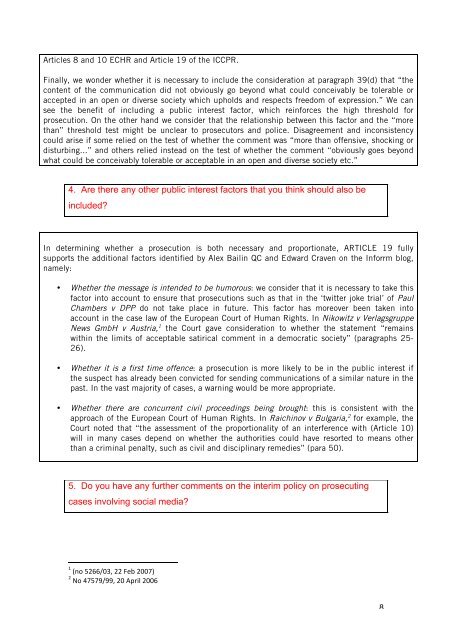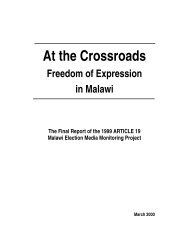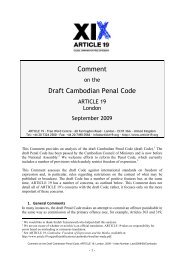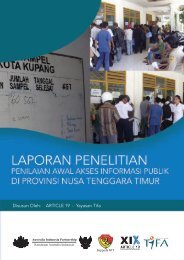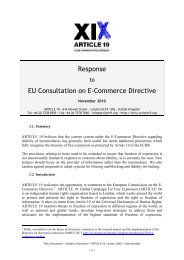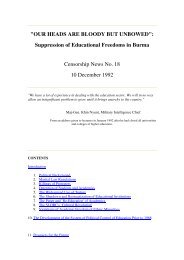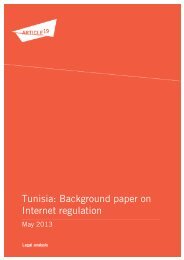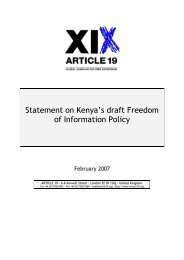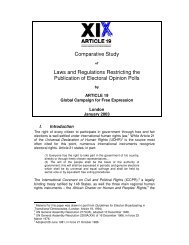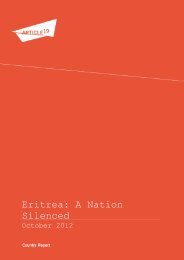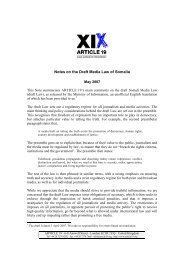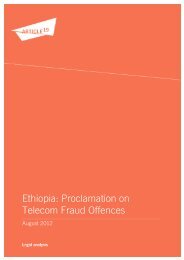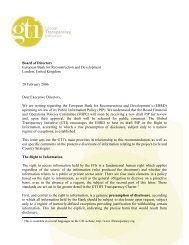Response to DPP Social Media Consultation - Article 19
Response to DPP Social Media Consultation - Article 19
Response to DPP Social Media Consultation - Article 19
You also want an ePaper? Increase the reach of your titles
YUMPU automatically turns print PDFs into web optimized ePapers that Google loves.
<strong>Article</strong>s 8 and 10 ECHR and <strong>Article</strong> <strong>19</strong> of the ICCPR.Finally, we wonder whether it is necessary <strong>to</strong> include the consideration at paragraph 39(d) that “thecontent of the communication did not obviously go beyond what could conceivably be <strong>to</strong>lerable oraccepted in an open or diverse society which upholds and respects freedom of expression.” We cansee the benefit of including a public interest fac<strong>to</strong>r, which reinforces the high threshold forprosecution. On the other hand we consider that the relationship between this fac<strong>to</strong>r and the “morethan” threshold test might be unclear <strong>to</strong> prosecu<strong>to</strong>rs and police. Disagreement and inconsistencycould arise if some relied on the test of whether the comment was “more than offensive, shocking ordisturbing...” and others relied instead on the test of whether the comment “obviously goes beyondwhat could be conceivably <strong>to</strong>lerable or acceptable in an open and diverse society etc.”4. Are there any other public interest fac<strong>to</strong>rs that you think should also beincluded?In determining whether a prosecution is both necessary and proportionate, ARTICLE <strong>19</strong> fullysupports the additional fac<strong>to</strong>rs identified by Alex Bailin QC and Edward Craven on the Inforrm blog,namely:• Whether the message is intended <strong>to</strong> be humorous: we consider that it is necessary <strong>to</strong> take thisfac<strong>to</strong>r in<strong>to</strong> account <strong>to</strong> ensure that prosecutions such as that in the ‘twitter joke trial’ of PaulChambers v <strong>DPP</strong> do not take place in future. This fac<strong>to</strong>r has moreover been taken in<strong>to</strong>account in the case law of the European Court of Human Rights. In Nikowitz v VerlagsgruppeNews GmbH v Austria, 1 the Court gave consideration <strong>to</strong> whether the statement “remainswithin the limits of acceptable satirical comment in a democratic society” (paragraphs 25-26).• Whether it is a first time offence: a prosecution is more likely <strong>to</strong> be in the public interest ifthe suspect has already been convicted for sending communications of a similar nature in thepast. In the vast majority of cases, a warning would be more appropriate.• Whether there are concurrent civil proceedings being brought: this is consistent with theapproach of the European Court of Human Rights. In Raichinov v Bulgaria, 2 for example, theCourt noted that “the assessment of the proportionality of an interference with (<strong>Article</strong> 10)will in many cases depend on whether the authorities could have resorted <strong>to</strong> means otherthan a criminal penalty, such as civil and disciplinary remedies” (para 50).5. Do you have any further comments on the interim policy on prosecutingcases involving social media?1 (no 5266/03, 22 Feb 2007) 2 No 47579/99, 20 April 2006 8


